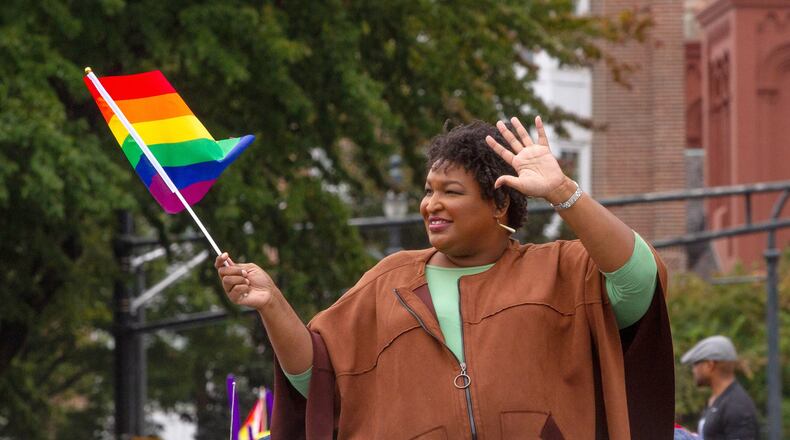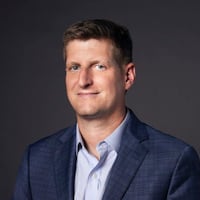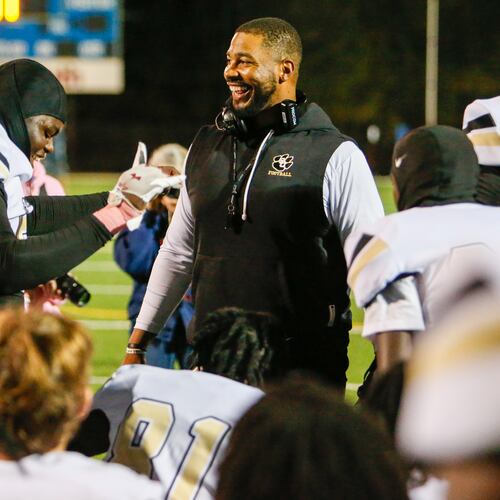Thousands of supporters of gay rights paraded down Peachtree Street waving rainbow flags Sunday at the 49th annual Atlanta Pride Festival.
Joining them for the parade this time around was nearly every Democratic politician from the area.
The LGBTQ event has transformed from an afterthought to a must-attend for every serious Democratic contender for office in Georgia.
Stacey Abrams, who last year became the first Georgia gubernatorial nominee to march in the parade, was this year's grand marshal. All five top Democratic contenders for U.S. Senate participated in the event. And so did a host of other elected officials and candidates.
It was the latest example of the growing clout of Georgia's gay community as it flexes its political and financial muscle. Despite chillier temperatures than Atlanta has seen lately and bouts of rain, the boisterous and vibrant parade attracted just about every major corporation in Atlanta, dozens of candidates and tens of thousands of voters.
“I’m proud of the fact that this year we’ve got a lot of politicians to realize that they need to show up and show out and show their support,” Abrams said Sunday just before the parade began.
It also has underscored a shift in Georgia politics as Democrats have more aggressively embraced LGBTQ equality – and used the issue to highlight rifts with Republicans on the campaign trail.
That was exemplified in June when Abrams accompanied her announcement that she would lead the parade with a shot at Republican Gov. Brian Kemp for supporting a "religious liberty" measure.
"We have an administration that is making life difficult for families wishing to adopt and patriots wishing to serve," she said in a video. "And we have a man in Georgia governor's mansion who still wants to sign discrimination into law."
No high-profile Republicans were expected to march in the Sunday parade, and Gov. Kemp’s office did not immediately respond to Abrams’ comments.
Jamie Ensley, president of Georgia Log Cabin Republicans, said his organization is working to get more GOP politicians involved in pride events. He said in election years, the group has a booth where Republican politicians visit and speak with festival attendees.
“Most LGBT voters vote for Democrats,” Ensley said. “So pride is probably not the most welcoming forum for Republicans during this current political climate. … But we do have friends of the LGBT community that are Republicans.”
Past statewide Democratic candidates have embraced gay rights but didn't put it at the heart of their campaigns. But the U.S. Supreme Court decision legalizing gay marriage and shifting political views on LGBTQ rights helped cement a more assertive Democratic approach on the issue.
State Rep. Renitta Shannon, a Decatur Democrat who is bisexual, said it was "long past time" for Democrats to fully embrace Pride events and LGBTQ issues.
“You can’t be fighting for values if you’re not willing to be visible on them and if it’s kind of a mystery what you stand for,” she said.
Abrams was joined by a host of other Democrats, including all four of U.S. Sen. David Perdue’s challengers: Sarah Riggs Amico, who lost a lieutenant governor’s bid last year; Jon Ossoff, who lost a 2017 bid for Georgia’s 6th District; Clarkston Mayor Ted Terry; and former Columbus Mayor Teresa Tomlinson.
It also was one of the first campaign appearances of Matthew Lieberman, the son of U.S. Sen. Joe Lieberman and the top Democrat in the race for Georgia's other Senate seat. That contest is for the seat held by U.S. Sen. Johnny Isakson, who is stepping down at year's end because of medical issues.
‘A long way’
Much of the LGBTQ discourse in last year’s race for governor revolved around the “religious liberty” legislation, a debate that has dramatically escalated since the last midterm vote in 2014.
Gov. Nathan Deal bucked his party in 2016 by vetoing a version of the bill, and some conservatives have pledged to revive it. In the runup to the GOP primary, Kemp and most of the other contenders for governor vowed to sign the measure into law.
He and other supporters see it as a noncontroversial way to defend against what they view as a siege on Christian values. They say it would also provide more legal protection to people of faith who object to gay marriage on religious grounds.
Opponents argue it amounts to legalized discrimination and warn of boycotts and other economic fallout if it’s adopted. Ahead of Deal’s 2016 veto, a string of major firms threatened to withdraw from Georgia if the measure took effect.
Seeking to tamp down the controversy, Kemp said in August 2018 he would veto any legislation that veers from a federal version of the bill signed by President Bill Clinton. He's since maintained his support for the legislation, which failed to gain traction this year.
Abrams said her campaign last year helped to stave off any attempts to pass a bill.
“We made folks have to have real conversations and I don’t remember seeing any religious liberty legislation pass this year,” she said Sunday. “They know that you’re a force. And they know that you’ve got allies that will stand with you and march with you and be with you.”
Even as Republicans have shied away from the event — one leader in the gay community said it was “extremely rare” for a GOP candidate to participate — Atlanta’s business establishment has embraced the three-day event.
Just about every major Atlanta-based corporation was represented: Coca-Cola, Cox, Delta, Home Depot, IHG Hotels, SunTrust, Turner and UPS each had large contingents.
That kind of support would once have seemed unimaginable. The Georgia Voice, an Atlanta publication geared toward an LGBTQ audience, published an item from readers last year sharing memories of past parades. This tale, from 37 years ago, stood out:
“1982. We all gathered near the corner of Peachtree Street and Forrest Avenue, now called Ralph McGill Boulevard. There were maybe 500 of us. No corporate sponsors. No floats. No politicians. Just a few hundred of us brave men and women. We marched down Peachtree to the steps of the State Capitol. Speeches. Pride. Protesters. Police. I was 20 years old. We’ve come a long way baby, and still got a long way to go.”
Keep Reading
The Latest
Featured



